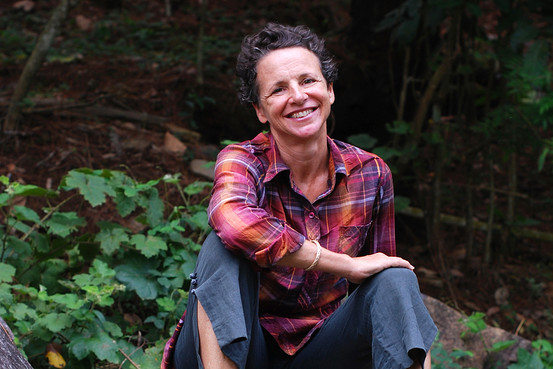This article originally appeared on September 29, 2014 in The Southeast Asia Realtime blog of the Wall Street Journal. The original page is here. This page is here for archival purposes only.
 Photo: Melanie Whitmarsh |
|
Elizabeth Pisani, a former journalist, analyst, consultant for various government health agencies and author of the new book “Indonesia, Etc.,” calls direct elections in Indonesia a “natural laboratory” for development. Lawmakers in the parliament put that lab to a test last week and rejected it, dealing a potential setback to future democratic progress in the world’s third-largest democracy. Ms. Pisani — who first went to Indonesia as a journalist for Reuters in 1988 — worked with the government in 2001, as it began a years-long process of decentralization aimed at shaking the shackles off decades under autocrat Suharto. She recently spent more than a year traveling through Indonesia’s outer islands, talking with people, drinking loads of tea and visiting the palaces of local district heads and sultans. She speaks with no reservations when she calls Indonesia a nation of muddlers – something she considers a strength. As citizens raged on social media and commentators chimed in about what happens now that a bill to scrap direct local elections has passed, Ms. Pisani shared her thoughts on regional autonomy. On arguments that direct elections cost too much It is true that elections are expensive, but the solution is not to just change to a different form of money politics and one that allows the elites to hold onto power. The thing that’s been a miracle is that this great laboratory of democracy has produced people … who would never have had a chance in the old system. And don’t forget that we tried the old system and it was thrown out because it was so corrupt. We’ve been through that; it’s not like we don’t know how that works. So to use the excuse of reducing the costs of elections by going back to that, I don’t buy it. On whether the vote represents a tug of war between the old and the new I see it as blatant obstructionism. I don’t think it’s a real tug of war. I don’t think it’s going to go anywhere. I think it’s sort of a last gasp of the old guard. On Indonesian voters I’m really constantly amazed by the sophistication of Indonesian voters. It’s really interesting the tenor of the political conversation has changed quite radically [since the election]. People really believe that change is possible, there’s a real belief that we’re facing a new way, and I think that’s interesting. On decentralization One of the interesting things about this dynamic (decentralization) is I think it is largely ignored by Jakarta, particularly the ministries, and I think it’s also ignored by a lot of the foreign communities, especially the donors. The conversations between a lot of the foreign governments and the multilateral conversations are taking part with the central government that behaves as though it’s still in control, but the reality is very, very different. On compromise I think Indonesia continues to find a middle path of compromise … because that’s the only way you can hold together a creature of such diversity. On what’s needed to bring development to the outlying islands It feels so World Bank 1987, but infrastructure is really, really important. If you have to sit on a boat for four days to get to the nearest hospital, as is the case in some parts of Maluku, you can invest in education all you want but if people actually can’t get around, if they don’t have electricity, if they don’t have – increasingly, access to the Internet … Those things really are quite fundamental to then enable you to use the education you’re getting. |
This article originally appeared on September 29, 2014 in The Southeast Asia Realtime blog of the Wall Street Journal. The original page is here. This page is here for archival purposes only.
